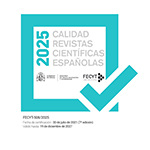Social inclusion in Chilean art museums: An analysis of the factors of accessibility, diversity and equity
Abstract
Social inclusion must be a guiding principle in museums considering perspectives of accessibility, diversity and equity that have not yet reached an adequate level of development and implementation. The objective of this study is to analyze in which aspects the notion of social inclusion features in Chilean art museums, in order to determine the role this concept has in their institutional mission and their educational practices, as well as to find out how such museums understand social inclusion. We work from a deductive qualitative analysis approach that allows us to identify the most present elements of inclusion factors through documentary analysis. For the analysis, a guideline of five pre-established categories was used: (1) orientation of the museum to the public, (2) type of public, (3) accessibility of the museum, (4) equity and diversity of the staff and (5) educational approach. The results of the analysis revealed that museums understand and approach the concept of inclusion from a reductionist point of view, mainly referring to the audiences. These results indicate the need to continue defining and training the institutions and their staffs regarding polyvocality, active education, and the equity and diversity.
Downloads
Article download
License
In order to support the global exchange of knowledge, the journal Arte, Individuo y Sociedad is allowing unrestricted access to its content as from its publication in this electronic edition, and as such it is an open-access journal. The originals published in this journal are the property of the Complutense University of Madrid and any reproduction thereof in full or in part must cite the source. All content is distributed under a Creative Commons Attribution 4.0 use and distribution licence (CC BY 4.0). This circumstance must be expressly stated in these terms where necessary. You can view the summary and the complete legal text of the licence.










